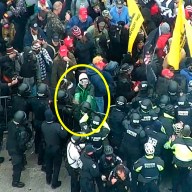‘Love’ The first thing you notice is the male lead’s Malcolm Gladwell. Specifically you notice it’s no prosthetic. The opening of Gaspar Noe’s latest maximalist provocation finds one Karl Glusman being actually serviced while he actually returns the favor on his female co-star, Aomi Muyock, all of it comin’-at-ya in first-rate 3-D. Satie gently graces the encounter, which lasts something like five minutes — long enough for time to evaporate. There will be many scenes like this over Noe’s art-porn epic, each one simulating the way sex creates a vacuum, shuttering its players from the rest of the world and reducing them into a feral, pure state of just bodies. RELATED: Gaspar Noe hates circumcision, loves Michael Bay The second thing you notice is that our lead male is a total dum-dum. After the overture comes one of Noe’s trademark abrupt, harsh cuts, jumping from the messy climax to Glusman’s Murphy years later. He’s in bed with a wife (Klara Kristin), who he does not like, and their baby, who he resents. “This place is a cage,” we hear him say in voiceover, in case we didn’t catch that from the misery on his face. Murphy is not a smart man, and his thoughts, frequently blasted on the soundtrack as the film jumps around his memories of his salad days with Muyock’s Electra (of course her name is Electra), are painfully banal. When he’s stoned he’ll say, “I’m really stoned now.” When he reflects on Electra, he earnestly muses, “Seems so long ago. Seems like another lifetime,” or “Please, Electra, come back. Come back. Come back.” In less enlightened moments he’ll look at his infant son and think, “I hope he doesn’t turn out gay.” The human mind works in abstract thoughts, and only occasionally in direct, complete sentences. But Murphy seems like he really does only think in basic phrases, which sound like Wikipedia pages done in simplified English. When he’s not thinking out loud, we can imagine there’s only empty air. At first the narration is jarring, then funny, but eventually it’s endearing, even impressive — as unique, in its way, as the voiceover in “Raising Arizona” or “Band of Outsiders.” You do more than get used to it, and not in the way you just get used to the subpar acting. (Great thespians aren’t going to bone onscreen for reals — not even Monica Bellucci and Vincent Cassel, whom Noe originally approached with the idea.) Protagonists are supposed to be of at least average intelligence, or at least we’re supposed to think they are. Murphy is slightly below the norm, and that becomes as perverse as the actual perversities that fill Noe’s epic running time. It’s oddly refreshing spending 135 minutes with a nincompoop, who doesn’t have much on his mind, who cuts to the chase, whose only talent is his (admittedly impressive) porking. He can be temperamental and dangerously impulsive, but most of the time he’s such a blank slate that we can project ourselves upon him, maybe do our own reflecting on old failed loves and our bygone youth. “Love” works that way too. Noe wants to create an inviting experience, a space for us to not just play voyeur to the bodies cavorting fleshily on screen but to engage with them by disappearing into our own memories. It wants to recreate the blissful narrow-mindedness of being in love. Of course, we know this because Noe, as usual, puts that right in the dialogue. Murphy, a film student (never seen coming close to making a film, though he is a little busy stupping), repeatedly talks up a movie he wants to make that is exactly the movie we’re watching. (He also namedrops “2001: A Space Odyssey,” a Noe fave he’s cited on film before.) Noe frequently comes off like a bro really worried other bros won’t understand his deep s—, which, like Murphy’s narration, is ultimately endearing, not aggravating. And RELATED: “Burnt,” with Bradley Cooper as Bourdain (again), is basic, which is fine It helps that Noe delivers the goods, in more ways than the naughty. Noe may overexplain what he’s doing but what he’s doing is original; his cinema is both populist and extreme. “Love” isn’t shot porno-style but with his usual symmetrical frames, assured long takes, frequent shots on backs of heads and pitiless cuts from nice things to bad. (Or the reverse: at one point he jumps from a character drunk vomiting to a P pulsing back and forth inside a V — a sight he already busted out in “Enter the Void” but not in 3-D.) In the past, Noe has frequently “gone there.” We can’t print the depravities in “I Stand Alone,” “Irreversible” and “Enter the Void,” but the big shocks in “Love” are more goofy, couldn’t-resist, including two separate cases where Glusman’s member stares right at us and shoots out the camera lens. The most upsetting moment is simply misjudged: a deeply uncomfortable scene where a drunk and jazzed Murphy almost makes it with a transgender prostitute but just can’t do it because, well, you know. (Murphy’s enough of a lummox that this could be read as more about his own limitations.) Most of the time “Love” is serene and melancholic, steeped in memories its hero wish could last forever — a sad dirge about someone who wishes he could get lost in his memories and never return. It’s “Eternal Sunshine of the Spotless Mind,” only with more threesomes in three dimensions.
Director: Gaspar Noe
Stars: Karl Glusman, Aomi Muyock
Rating: NR
4 (out of 5) Globes
‘Love’ is a 3-D art-porn with real sadness and real schlongs
Follow Matt Prigge on Twitter @mattprigge


















